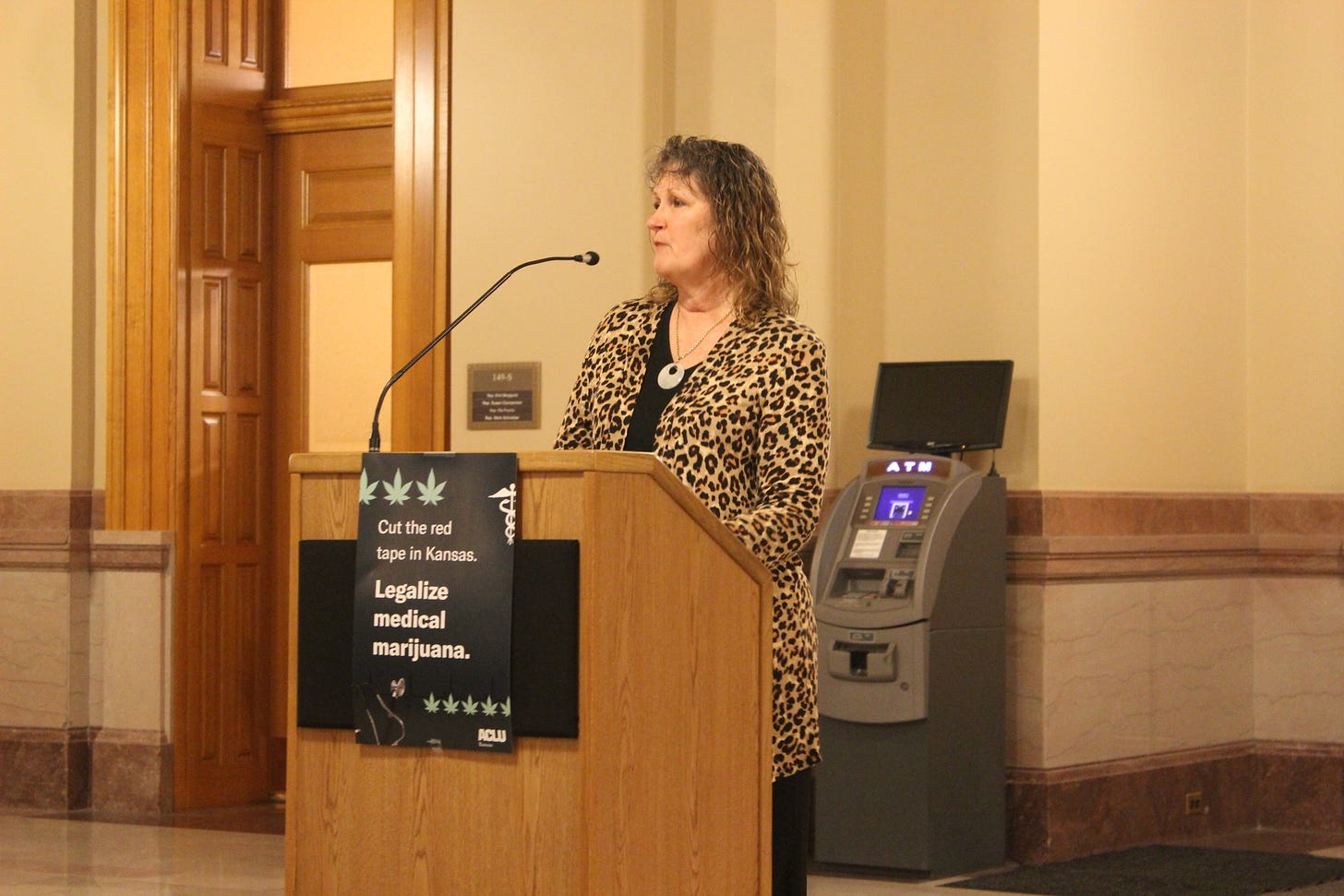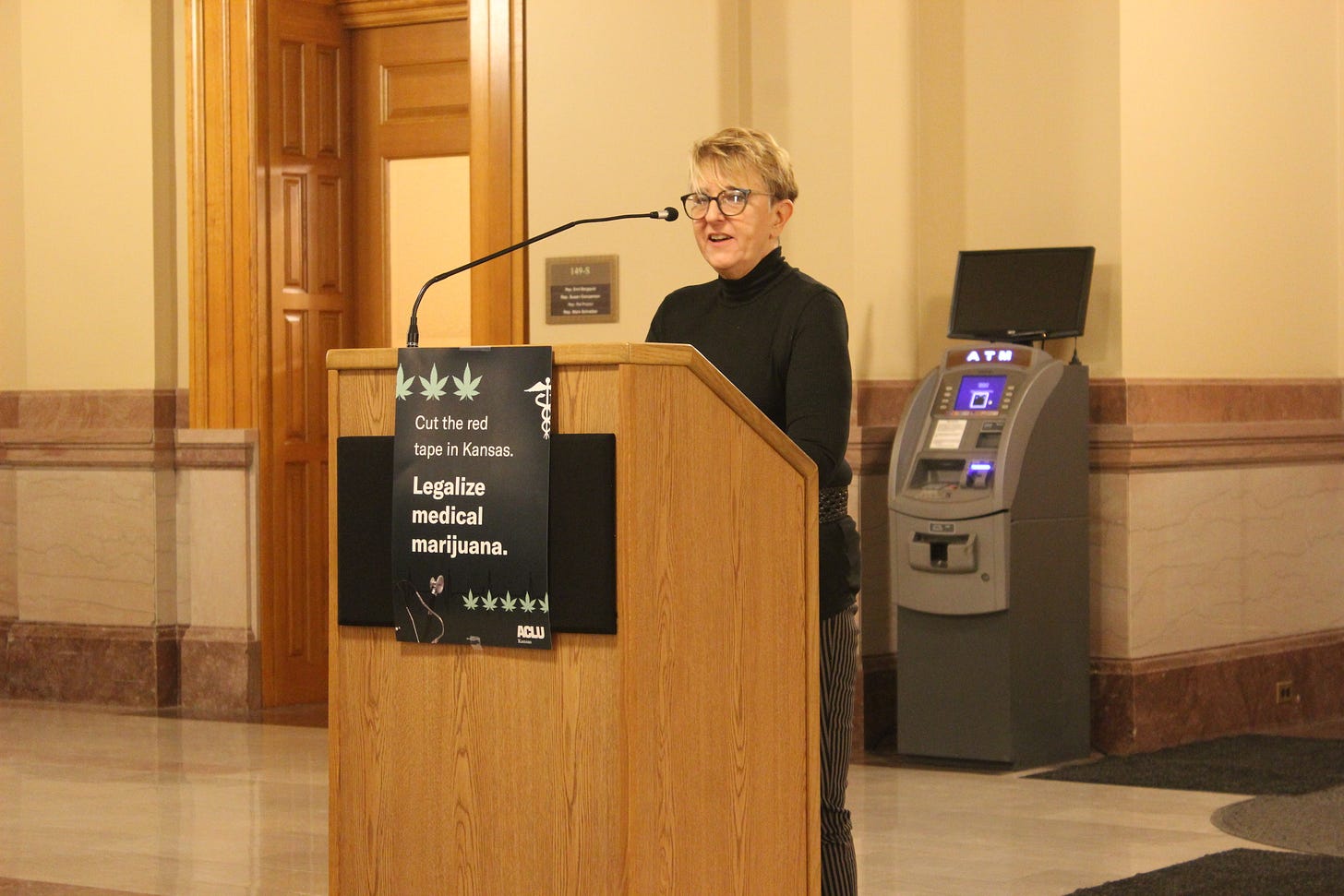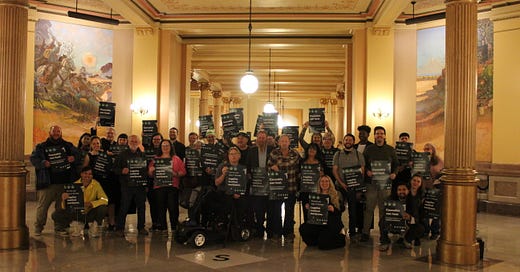ACLU hosts “Medical Marijuana Day of Action” at Kansas Capitol
Article/Marijuana - 13 minute read

Over 60 people gathered inside the Kansas state capitol to listen to medical marijuana advocates and be provided with information on how to speak to legislators regarding gaining support for the passage of medical marijuana in hopes of making Kansas be the 47th state to have marijuana legalized in some form. People began gathering inside around 9 a.m. on Wednesday, February 22, 2023, where they were able to receive information from different tables including the ACLU of Kansas and the Cannabis Coalition.
Attendee Justin Doan shared how medical marijuana directly impacts his life as someone who has lived with epilepsy since he was seven years old, and the struggles he has had when it comes to laws around the drug.
“I was always told, growing up as a teenager that marijuana would kill me,” Doan explained. “However, when I turned 18, marijuana was actually legalized in Michigan. So, my neurologist had suggested that I should try marijuana because my medication wasn’t working at that time. So, I tried marijuana. I was referred to a homeopathic doctor. I was suggested a specific strain of marijuana and concentration, and I started using it ever since.”
Doan explained that he has only had one seizure since he started using marijuana when police arrested him for the drug in Illinois. He spent three nights in jail deprived of his medication which led him to have a seizure where he hit his head and almost died.
“I was sentenced to probation and when I was on probation… in Illinois it was actually legalized for medical use,” Doan said. “So, I had a court order that allowed me to use marijuana and continue to grow my own marijuana…. So, I was on probation for marijuana, and I was allowed to use marijuana, so kind of a hypocritical thing to take place at that time.”
Doan moved to Kansas and is expecting his first baby and said that none of that would be possible without marijuana as he was told he wouldn’t be able to drive, go to college, or even graduate high school due to his epilepsy.
Attendee Cheri Cowman of Paola, KS was also there in support of her daughter-in-law, Mandy Sohosky who was speaking at the event.
“I came with my daughter-in-law who is a speaker today,” Cowman said. “She has suffered from severe migraine headaches for about 23 years, and they are absolutely incapacitating. But she has found that she can take the marijuana gummies, whatever, and that helps alleviate the pain. These headaches normally last several days. We’ve got three kids that she’s raising, and she’s missed many of their activities because of the pain. And when she found something, finally after this amount of time that will alleviate that and make life a little bit more normal for her, I came to support her.”
While supporters of medical marijuana gathered for the event, those against medical marijuana gathered in the prayer room on the second floor of the Capitol at 9:30 a.m. They met to pass out material explaining the dangers of legalizing medical marijuana with one of their handouts being quotes from Democrats who voted to legalize the drug in states that have legalized its use, only to warn others after seeing the fallout.
“The money behind the medical marijuana is the real goal,” Phillis Setchell of Culture Shield Network wrote in an email to The Kansas Constitutional. “I’ve had articles about billionaire George Soros from the early 2000s that explain Soros is funding medical and recreational marijuana. Another article that I hadn’t seen before showed up on my news feeds from April 3rd, 2014, by USA News, ‘Billionaire George Soros behind major push for marijuana legalization’. To quote from the article, ‘Records obtained by the Times also reveal that Soros cuts other substantial checks annually to the American Civil Liberties Union, ‘which in turn funds marijuana legislation efforts,’ Riddell Wrote, as well as the Marijuana Policy Project which funds state ballot measures.’”
Several of those that showed to pass out material also prayed for “wisdom in the legislators” on this and on other bills as well.
By 10 a.m. Field Director of ACLU Kansas Leslie Butsch opened the rally by introducing Vice President of the Kansas Cannabis Coalition Cheryl Kumberg.

“If I could sum up who I am in three sentences, I would tell you that I am a dedicated, rural cannabis nurse,” Kumberg said. “I am a fierce patient advocate. And I advocate for body, mind, and spiritual healing…. We at the Kansas Cannabis Coalition feel that it’s very important that we stay focused on what cannabis patient needs are…. There’s three medical marijuana bills right now. There’s two in the Senate and one in the House…. The key to any bill is to have the end product be affordable and accessible to patients. Kansans from all walks of life deserve to have a place in the cannabis market.”
Kumberg mentioned issues with SB 135, SB 171, and HB 2417 including high license fees, the absence of important medical conditions, a product formulation miscalculation, unnecessary involvement of pharmacists that will add costs to dispensaries and be passed onto patients, among other problems.
Project Coordinator for New Frontiers Alejandro Rangel-Lopez introduced himself next, informing attendees he would be introducing the rest of the speakers starting with Mandy Sohosky, a Paola mother of three.

“I am an advocate for medical marijuana because I have memories left to make,” Sohosky said. “I was raised in a very conservative Christian home. I did all the DARE programs. No smoking. I even went to a Christian college. In college, I started getting migraines…. Mine didn’t come once a month. They came two to four days a week. For 23 years I have fought a migraine battle…. I tried all the remedies. I’ve done all the tests. I’ve taken every preventative medication and every medicine that’s supposed to stop them…. They told me I had mini strokes because my pain levels were so high.”
Sohosky listed all the different things she tried from sleep studies to exercises and diets to dry needling where they stuck needles in her neck and hooked her up to electricity. She claimed her medical professionals eventually gave up, prescribing her muscle relaxers and opioids. She tried medical marijuana in a state where it is legal, stating that ten minutes after trying it she cried because the chronic pain was gone. She listed a few things that she could not do due to her migraines including attending events to support her kids, unloading the dishwasher due to the clinking of plates, and attending an entire church service.
“The solution doesn’t cause addiction like the opioids do,” Sohosky said in closing. “It doesn’t cause me stomach trouble like the medicines they give me now. There is a solution for my pain. Please allow me to use it while my kids are still young, before my parents are gone. I have memories that I am missing out on.”
Dealing with chronic pain and mobility issues, retired teacher from Leavenworth Mary Murray spoke next. Having lived an active lifestyle with her late husband, she began feeling pain about twelve years ago. She found that she had some “pretty bad arthritis” and was prescribed opioids of which she did not take, knowing of their addictive properties. She looked at holistic treatments which she said helped, but only to a point. Still having days where she can’t get out of bed, she went back to the hospital only to once again be told she would be prescribed opioids. When she turned that down, her next option was steroid injections.

“I’m more of a holistic person, and I believe that God put these herbs on earth so we can take care of ourselves,” Murray said. “I have family living in Missouri. While I was over there last summer and over the holidays, I tried a marijuana vape pen…. Within ten minutes, my nerve pain around those joints that were deteriorating relaxed. It was a miracle. I couldn’t believe it. I really feel that as a society that we should want to help those experiencing pain… and under a doctor’s supervision and care, it’s much safer than opioids.”
Murray closed sharing her experience caring for her late husband who died of stage 4 cancer which went into his brain, stomach, liver, and lungs. He was on chemotherapy six days a week, three weeks on, two weeks off for a year. She said she knows now the suffering he endured could have been eased with medical marijuana and she wishes she had the opportunity to provide the medicine to her late husband.

An advocate for medical marijuana since watching his friend, veteran Dave Auble, go through and eventually succumb to cancer, veteran Chris Howell was the next to speak. He mentioned how he wished his friend was still there and how he has been coming to the Capitol every year and how he could personally benefit from the legalization of medical marijuana after an accident.
“I’ve been the opioid crowd,” Howell said. “I spent a decade on them. We just need to get this done. It’s time.”
Owner of the Kansas Hemporium in Dodge City Melissa Goldsberry provided a small business perspective. She shared the story of her daughter’s chronic illness which drove her to become an advocate for medical marijuana.

“In 2018 I felt the need to make a career change,” Goldsberry said. “I was probably more interested in moving, but the answer seemed to be that I needed to stay here in Kansas, and I needed to wake up the fight. So, the Kansas Hemporium was born. And I’ve been in the CBD space since its legalization and advocated for medical cannabis legislation during this time to make this a state that no longer hates sick people. We’ve seen bills come and go, but the common theme has always been fought for by advocates to keep it local and to have a bill that reflects Kansas, which is mostly rural.”
Goldsberry noted that bills from past and present legislation included high yearly licensing fees and working with pharmacists in ways that would hurt the business, and the importance of having a bill that would put a “dent” in the black market.
“It’s my job as a business owner to spot opportunity and risks, and medical cannabis has plenty of both,” Goldsberry said. “But there are answers right here in our communities. Representative Highberger’s (D) sponsored bill HB 2417 speaks to much of what Kansas needs and the Kansas business owner. Tiered licensing of sorts with a $10,000 cap. No less than 15 percent of licenses being given to economically disadvantaged people groups. Homegrown to help keep patient’s costs low…. But bills don’t stay the same as they go through the process…. It has been and will continue to be imperative for people like me in Southwest Kansas to have groups like those represented here today. The ACLU, Loud Light, New Frontiers, Kansas Cannabis Coalition, Kansas Cannabis Chamber of Commerce, and Planted Association of Kansas to keep boots on the ground in Topeka so we have some idea as to what’s going on.”
Former U.S. Attorney for the District of Kansas Barry Grissom talked about his time serving under the Obama Administration from 2010 to 2016 where his office prosecuted people on different drug offenses.

“Marijuana, under the Federal Control Substance Act is right next to heroin,” Grissom said. “People in this building are sent here to make good public policy that makes life better for citizens. This is bad public policy.”
Grissom also said that he learned in his career that law enforcement needs resources they don’t have when it comes to enforcing these laws and that they are a waste of taxpayer dollars and it draws law enforcement away from keeping people safe due to the time it takes to investigate, arrest, prosecute, and incarcerate someone for the medicine they need for their condition.
Grissom also talked about a couple of success stories he had representing Kansans who had been arrested for marijuana.
Handling many cases related to our criminal legal system, including policing practices, Legal Director of the ACLU of Kansas Sharon Brett spoke next.

“I’ve seen how the police across our state use drug enforcement, including marijuana enforcement, as a license to run roughshod over the constitutional rights of motorists and community members,” Brett said. “I’ve seen how individuals are denied access to diversion and other programs that might benefit them because they’re charged with marijuana possession, and prosecutors don’t want to grant leniency to so-called ‘drug offenders’. I’ve seen how the overcriminalization of marijuana offenses including possession of small amounts of marijuana for personal, medicinal use has created overcrowding in our county jails, resulting in profoundly unconstitutional living conditions for the people who are incarcerated.”
Brett shared that 52 percent of drug incarceration was made up by marijuana possession of all drug arrests in Kansas in 2018. She also said that hundreds if not thousands of Kansans on any given day are incarcerated in local county jails for marijuana possession, many being minorities, with Black Kansans being more likely to be arrested for marijuana possession than White Kansans. Brett also said that Kansas ranks twelfth in the nation for racial disparities in arrest rates for marijuana possession with Black Kansans being 4.8 times more likely to be arrested for marijuana possession than White Kansans.
“Convictions, even for simple possession, have consequences,” Brett said. “Even if it’s just a misdemeanor offense that’s for simple possession, that can come with a large amount of onerous court costs and fees which can mount overtime, add up, and drive somebody into significant debt. If an individual misses a payment on their court fines and fees, then there could be a warrant issued for their arrest, and they get incarcerated for nonpayment. All of this happens to Kansans every single day just for trying to access medicine they need. Medicine that is safe, effective, and humane.”
Brett finished speaking, wanting to convey that medical marijuana is not just a criminal justice issue, but a racial justice, economic justice, and community justice issue and a public health and constitutional imperative.
Kansas Black Commission Center President Kerry Gooch, one of the lobbyists for medical marijuana, highlighted the fact that over 60 percent of Kansans already support passing some form of marijuana legalization in the state of Kansas.

“Our ask is simple,” Gooch said. “We need the Kansas Legislature to pass a medical marijuana bill that prioritizes access to patients, to small, local business owners, and that reinvests in the communities that have been impacted the most by the criminalization of marijuana.”
Gooch also said that while he has no problem with bigger businesses coming into Kansas to make money on medical marijuana, he would like to see small, local businesses have access and take advantage of this industry in Kansas by ensuring there aren’t high barriers of entry.
Field Director for the ACLU of Kansas Leslie Butsch spoke briefly with two asks of the attendees. The first being to hold up a sign demanding that the legalization of medical marijuana does happen in Kansas this year and gather for a photo. The second being to have the attendees fill out postcards and give them to their lawmakers.

Alejandro Rangel-Lopez finished the rally with a couple of chants before the attendees gathered for the picture and went off to find their legislators.




Well written story, thank you! In reality, it's probably just a matter of time, and not much time, if George Soros is behind the push. I don't think MEDICAL marijuana would be that bad, but that's always just the camel's nose.